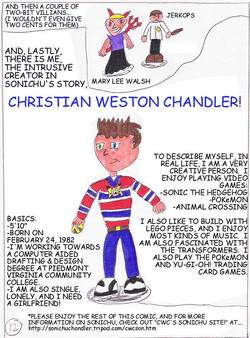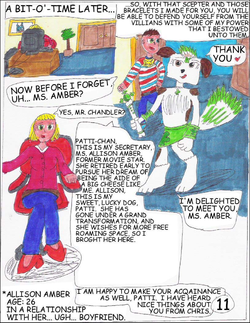I am unsure about how much of Chris' stupid behavior is from low IQ, how much is from his autism, and how much is from his lack of education.
You just have to look at his old high school homework. It's like it was written by a first grader. Smart autistic people learn very well academically. They have to, because they suck so bad at social intuition/empathy. Chris can't even figure out how to use a computer properly, which is why he kept using his game consoles for his creative projects.
His constant misuse of words even though definitions of them are a google search away. His lack of understanding of the world even though Wikipedia exists. An even remotely intelligent autistic person might not pick up that they were being trolled by PandaHalo, but would be able to understand that Australia is a huge country, and pull up a map of the bushfires and determine if they were in her location or not.
I tend to lean towards Chris being stupid though. Autism can't explain everything.
Chris's language skills are actually fairly well developed, considering that he's, y'know, Chris. Consider this page from Sonichu #0 from 2004-05:

Chris uses "two-bit" (correctly hyphenated, it should be noted) idiomatically here, but his use of "two cents" later is both a mild bit of parallel wordplay and a demonstration that he understands that two bits is a term for a quarter (and a somewhat outdated one at that, showing the breadth of his language acquisition). That's actually kind of impressive. He also describes himself as Sonichu's "intrusive creator," which is a thoroughly reasonable way to characterize his role in the story, and one he clearly came up with himself, as "intrusive creator" is not a common phrase. Also notice that he includes two bulleted lists and properly uses a colon to start both of them, which is a bit beyond elementary English.
Here's a page from Sonichu #6 from 2006-07, which I believe would have been the last issue he completed before the Internet started breaking his brain:

"A bit-o'-time later" is relaxed and colloquial and fits perfectly well with the tone of the story. Likewise with "Uh..."; it's somewhat unusual to see filler words like "uh" spelled out on the page, but it's something that would occur quite naturally in conversation and adds verisimilitude. Though Chris's usually spelling quirks and typos are present, all the sentences are constructed and punctuated correctly, despite some of the sentences being rather complex.
We can even look at the simple panel that confronts us every time we visit the front page of the CWCki:
"Some not-so-good news" is an example of a compound modifier, which is a multi-word phrase that is used to modify a noun or verb as if it were a single word. The words in a compound modifier are correctly connected with hyphens, as Chris has done here. It is well constructed and does not read as awkward or out of place.
To be clear, most of these are things that even average students pick up by the time they're 10 or 11. But it's one thing to understand these constructions and techniques, and quite another to be able to use them in writing, naturally and frequently, the way Chris does. A lot of people never really master it. If you don't believe me, go look at your relatives' Facebook posts.

